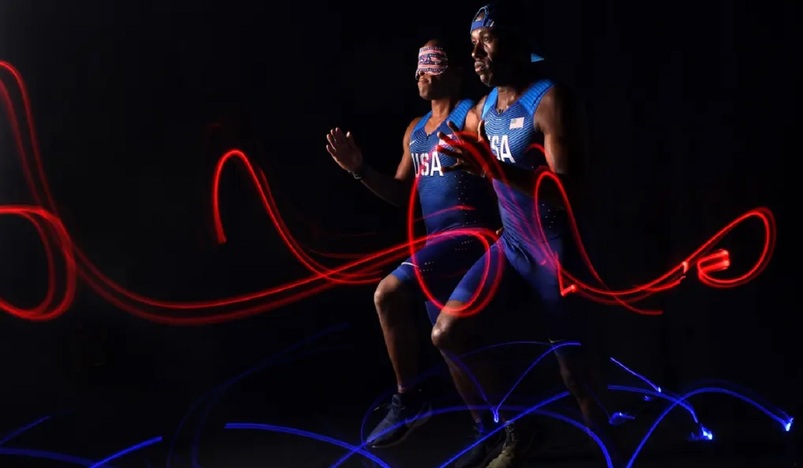
‘The possibilities are endless on how fast we can go,’ says Paralympian David Brown, the world’s fastest blind athlete
David Brown and guide Jerome Avery were set to take Tokyo by storm. But Avery must now watch from the sidelines.
David Brown was running through Manhattan’s Central Park when he heard a familiar voice.
“Is that you, baby?” asked the woman.
“Momma?” said Brown.
Indeed, it was, but Brown wasn’t certain until she held him close.
After contracting Kawasaki disease as a toddler – something that eventually led to him losing his sight at 13 – the American athlete heads to the Tokyo Paralympics later this month as the world’s fastest blind man. He eagerly anticipates the opportunity to rip up the script again, further cementing his place as the gold standard for Paralympians.
Francine Brown, David’s mother, had flown to New York City from her home in Kansas City to surprise her son who was starring in a film about his fractured road to Japan. Although their meeting was beautifully captured in the documentary Untethered, produced by Swiss sportswear company On and released on Monday, it’s hard to fully compute just what Brown has achieved.
Every elite athlete has extraordinary tales of hardship and sacrifice, but try running in a straight line with your eyes closed at full-pelt. Brown accomplishes it all with aplomb: he was the first blind athlete to run 100m in under 11 seconds when he clocked 10.92 in 2014 and is aiming to go even faster in Japan.
“I think because of the technical aspect, the 100m is the most difficult event,” the 28-year-old tells the Guardian. “You have to be so precise. One wrong step and that could be it. Every step counts. It’s hard for us ‘blindies’.”
Brown has been assisted in recent years by Jerome Avery, the running guide who helped him win gold in Rio five years ago. They are temporarily connected by a small tether during races, yet eternally bonded by friendship and shared experiences.
The duo have been together since 2004, although the heartbreaking decision was made in late July to bring in a new guide because of Avery’s ongoing injury over the past year. As a result, a new guide will be by Brown’s side in Tokyo, yet the mechanics and complexities of the race remain.
“For someone to trust another to run full throttle, with his eyes closed and just listening to my voice, is magnificent,” says the 42-year-old Avery who missed out in the US trials for the 2000 and 2004 Olympics. Close, but not close enough.
“I’ve put on the blinders and couldn’t run more than three feet, let alone three metres,” he says. “The first thing I wanted to do immediately was open my eyes, even when I knew I was in a super huge open field, and there was nothing around me. But that’s me not trusting myself.”
Avery is faster than Brown: he boasts a personal best of 10.16 for the 100m – but a guide’s role is far more encompassing than just hurtling towards the finish line.
“Sometimes you’ll see guides, kind of veering slightly in front a little bit, but as long as you’re not pulling the athlete that you’re running with, that’s usually fine,” he says. “There’s enough margin for error. And, there’s a little bit you can kind of play with, versus [being in] front or versus too far back, and get away with.

David Brown and Jerome Avery during a training session. Photograph: Jasmine Safaeian
“But because I am faster than David, it’s easier for me to make those adjustments. Perfect example, when the gun goes off, I don’t know how he’s gonna react to the gun. He may react much faster than me. But it’s up to me to not panic, to make sure I’m like, ‘OK, let’s go.’”
The dismissal of such a trusted guide as Avery is undoubtedly a painful setback, yet Brown has dealt with, and overcome, far more striking problems. He was blind in one eye by the age of three, and his mother made the difficult decision to move the family from Kansas City to St Louis in order to attend a specialized middle school and high school.
First came denial, then realization. The road to acceptance was treacherous. Visually impaired athletes begin to run using a wire guide to help them navigate the track, although running with just one arm pumping isn’t ideal preparation for Paralympic gold.
“This level of competition is so different,” Brown says. “Plus, I need someone who can run alongside me.”
When his first running coach, Tim Cobb, from the Missouri School for the Blind was also flown into New York City for the documentary, his pride when reminiscing about his famous protege was unmistakable.
“He was an excellent athlete. When he first arrived, he was just really gifted,” he says. “You can kind of tell straight away. Right from the start. And then he just got better and better. He had another gear that other people just don’t have.”
Many children with visual impairments struggle initially with their diagnosis. Some retreat into their shells, unable to move forward with their altered lives. Brown, too, found the adjustment difficult, but was able to adapt thanks to his love of sport.
After winning a school competition by writing a 500-word essay, he was given the opportunity to attend the 2008 Paralympics in Beijing.
“Back then, it was small and there was a good chunk of us,” he recalls. “And, when I say ‘chunk,’ I mean about four of us who did like all the sports and stuff, and my coach willed me on, he helped me get into The United States Association of Blind Athletes.
“He took me to all these other events that were outside of the Missouri School for the Blind and helped me see there’s something outside of just doing this high school track – that you can actually go somewhere with this.”
The short film, written by award-winning creative director Andy Fackrell and directed by Andrew Dosunmu, presents the unsuspecting Brown with a series of surprise visitors, from meeting Curb Your Enthusiasm star JB Smoove to Black Thought of The Roots. Bafta-nominated composer Peter Raeburn provides the soundtrack.
“On has always been about the human spirit and the enduring power of the human spirit,” says head of sports marketing Feliciano Robayna, who is also executive producer of the documentary.
Brown is an engaging figure, full of laughs and excited about the future. He is engaged to be married and wants to use his experiences to help others.
“David’s very independent,” says his mother, Francine. “He does need help on some things, but he’s a very independent person. I raised him like that because I didn’t want him to be where he would always have to look like he needed somebody there to help.
“He has his own place now. He cooks. His fiancee does many more things than I’ve ever been allowed to do. She’s let him drive. She’s sitting in the car and lets him drive in the parking lot. He mountain-climbs and hikes. It’s not just David Brown, the Paralympic athlete.
“In the future, I can see him owning a business, going out and encouraging people, being a spokesperson. David is just a great example of someone that’s just dealt with adversity in the best way possible. There are no limits.”
Source: The Guardian
.jpg)
Qatar Secures Place Among the World's Top 10 Wealthiest Nations
.jpg)
Hamad International Airport Witnesses Record Increase in Passenger Traffic

Saudi Arabia: Any visa holder can now perform Umrah

What are Qatar's Labour Laws on Annual Leave?
Leave a comment